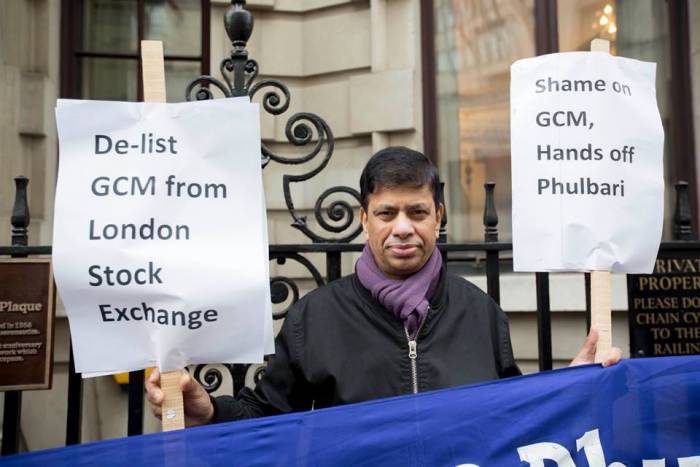LONDON– Bangladeshi community and transnational campaigners against the development of coal mines in the Phulbari region of Bangladesh are protesting at the annual meeting of London based company GCM resources. The coal company plan to start mining in Phulbari and build a 6000 MW power plant.
“If the mine is built, it would lead to the forced-displacement of up to 230 thousand people over the 36 year life cycle of the project. It will increase poverty, water pollution and will plunder 14,600 hectares of Bangladesh’s most fertile and productive agricultural land in the region, causing a crisis of food production. It will have a devastating impact on the people and the environment. In return Bangladesh govt would gain nothing but economic exploitation”, stated Dr Rumana Hashem of Phulbari Solidarity Group.
Construction of the plant is dependent on approval from the Bangladeshi government who previously shelved plans for the development following massive protests. In 2006 an 80,000 strong march was attacked by law enforcement officers resulting in the deaths of three protesters and injured 220 more. GCM’s CEO Gary Lye has been targeting local opponents. He filed multiple arbitrary cases against 26 frontline local leaders against mining.
Activists sung carols and played drums at the front entrance of the building where the AGM was held. Protestors were also inside the meeting and read out a response from the communities from Phulbari signed by 50+ community leaders in the region.
The protest was organised by the Phulbari Solidarity Group, the UK branch of the Bangladesh National Committee and supported by Reclaim the Power, Extinction Rebellion and 350.org.
Phulbari Solidarity Group is a transnational activist group which exists to support and represent the communities located within the Phulbari region of Bangladesh in opposing the plans for a large-scale open-cast mine in the region.
“Currently Bangladesh produces very little of its electricity from coal and whilst many other countries in the world are looking to transitioning away from coal, the Bangladesh government is planning to massively expand energy production through coal. “ We have published an alternative plan for power generation that demonstrates there is no need to take disastrous path of coal mining and coal power plants to meet power demand in Bangladesh”. Akhter S Khan, NCBD (National Committee to Protect Oil Gas Mineral, Resourc es Power and Ports, Bangladesh)
es Power and Ports, Bangladesh)
350.org is working with organisations across the globe to stop the development of fossil fuel infrastructure.
“The construction of any new coal power plant is inconceivable given the findings of the IPCC report released in October 2018.. Every ton of coal burned makes an immediate contribution to the quantity of CO2 in the atmosphere causing long term and irreversible climate change. We need to keep fossil fuels in the ground now to ensure that we stay below 1,5 degrees in order to avoid catastrophic environmental breakdown. ”
Hoda Baraka, Global Communications Director, 350.org